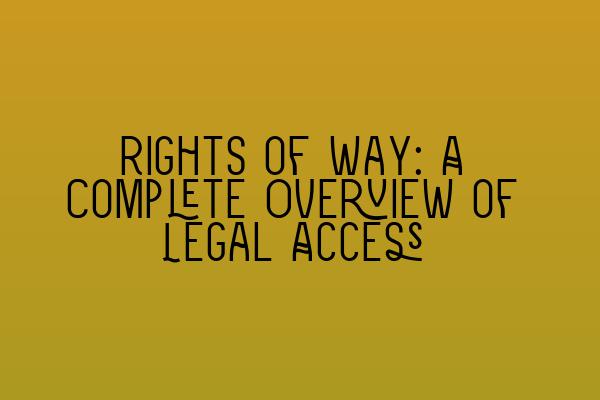Rights of Way: A Complete Overview of Legal Access
Introduction
In the world of property law, rights of way play a crucial role in ensuring easy and legal access to various properties. Whether you are a property owner or a potential buyer, understanding the concept of rights of way is essential to make informed decisions and avoid legal disputes.
In this comprehensive guide, we will provide you with a complete overview of rights of way, explaining their definition, types, creation, enforcement, and termination. So let’s dive right in!
What are Rights of Way?
Rights of way, also known as easements, are legal rights that allow individuals to pass through or use another person’s property for a specific purpose. These rights ensure that property owners have a legally defined access route to their land or property, even if it requires crossing someone else’s land.
Types of Rights of Way
There are several types of rights of way, each serving a specific purpose. Some common types include:
1. Pedestrian Rights of Way: These rights allow individuals to pass through a property on foot, ensuring easy access.
2. Vehicle Rights of Way: Vehicle rights of way enable the use of a specific route or road by vehicles, ensuring convenient transportation.
3. Driveway Rights of Way: Driveway rights of way grant access specifically for vehicles to enter and exit a property through a private driveway or shared access road.
4. Agricultural Rights of Way: These rights enable farmers and agricultural workers to access their fields, barns, or other agricultural areas without interfering with neighboring properties.
5. Utility Rights of Way: Utility companies may be granted rights of way to install and maintain utility services, such as gas, water, or electricity lines, to serve multiple properties.
Creation of Rights of Way
Rights of way can be created in several ways, including:
1. Express Grant: When a property owner voluntarily grants a right of way to another party, it is considered an express grant.
2. Express Reservation: A property owner may reserve a right of way over a property they sell to ensure continued access to their retained land or property.
3. Implication: In certain cases, rights of way can be implied based on the common intentions of the parties involved or the historical use of a particular route.
4. Prescription: Over time, continuous and uninterrupted use of a specific route without interference can give rise to a prescriptive right of way.
Enforcement and Termination of Rights of Way
Once a right of way is established, it is important to understand how it can be enforced and under what circumstances it can be terminated.
1. Enforcing a Right of Way: If someone interferes with your right of way, you have legal options available to enforce it. This may involve seeking a court injunction to stop the interference or claiming damages for any losses suffered.
2. Termination of a Right of Way: Rights of way can be terminated through various means, including mutual agreement, abandonment, release, or a court order. Additionally, if the purpose for which the right of way was created no longer exists, it may become obsolete.
Conclusion
Rights of way are a fundamental aspect of property law, providing essential access to properties and ensuring the smooth movement of individuals and vehicles. Understanding the various types, creation methods, enforcement, and termination of rights of way is crucial for both property owners and potential buyers.
If you require further guidance or clarification regarding rights of way, SQE Property Law & Land Law is here to assist you. Our team of experienced solicitors can provide expert advice and assistance in all aspects of property law, including rights of way.
For additional resources and preparation materials related to SQE exams, check out the following articles:
– SQE 1 Practice Exam Questions: Test your knowledge and preparation for the SQE 1 exam with our practice questions.
– SQE 1 Practice Mocks FLK1 FLK2: Get a feel for the actual exam with our SQE 1 practice mocks, designed to assess your readiness for the SQE 1 exam.
– SQE 2 Preparation Courses: Prepare yourself for the SQE 2 exam with our comprehensive preparation courses, covering all relevant topics and providing invaluable insights.
– SQE 1 Preparation Courses: Enhance your SQE 1 exam preparation with our specialized courses, tailored to help you succeed in the exam.
– SRA SQE Exam Dates: Stay updated with the latest exam dates and deadlines for the SRA SQE exams.
Remember, having a solid understanding of rights of way and other legal aspects of property law is essential for anyone involved in property transactions. Stay informed, seek professional advice when necessary, and ensure a smooth and legally compliant process.
